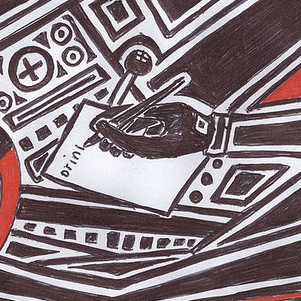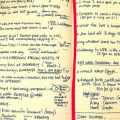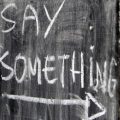How to Write a Book

Most important: to write a good book, you need a good idea. No one wants to read a book without an idea, no matter how well written it may be. Always start with something to say.
But let’s look at the practical aspect—how do you actually write a book?
It turns out it’s not that difficult. You basically work with the time-and-money concept, where you break down exactly what you need to accomplish the desired goal. How much is required?
In this case, the money part is easy: You need exactly zero dollars. Writing a book is completely free, at least in terms of financial cost.
The time cost is variable; some people write faster than others.
Therefore, your main deliverables are chapters and words. You need to break these deliverables down and create an advantage that allows you to tackle them in small, recurring steps.
Let’s say you’re writing a non-fiction book. A good target to shoot for is twelve chapters and 60,000 words—approximately 5,000 words per chapter. Once you get in the habit, it’s fairly easy to write an average of 1,000 words a day, sometimes more.
However, most of us aren’t actually able to write a decent book in just 60 days. This is because writing a book is different from journal writing or blog post writing. Instead of just keeping your head down and pressing on, you need to constantly consider the overall arc and structure. Before you have a finished product you can be proud of, you’ll likely need to do major revisions along the way or at some point afterward.
Despite the need to think about structure, it’s also important to keep moving along however you can. One tip: don’t try to write a perfect Chapter 1, then a perfect Chapter 2, and so on. If you’re talented enough to do that, great. But many writers find it much easier to write a detailed outline first, then sketch out as many notes as possible for each chapter. When you get stuck, move on to another chapter. This helps you to get closer to your word count goal, which is the primary target in the beginning.
Because you’ll be writing a lot, accept the fact that a good portion of the words you write won’t go in the final manuscript. I wrote more than 85,000 words for my upcoming book, and we’re going to publication with about 72,000. You can sometimes reposition the extra content for something else, like an online resources area or the beginnings of another book. (Other times, outtakes are outtakes for a good reason. Let them go.)
Every day, keep working toward your quota. Worry about this quota more than worrying about brilliance. Once you get close to the quota, that’s when you go back and begin stage #2: editing and curation. What do you have that’s good here? What should be discarded? What can be reworked?
The editing process will likely take as long as the actual writing, because you can no longer ignore the parts where you get stuck and ignored the problems. Now you need to solve the problems, provide more examples, clean things up, and turn your mass of words and draft chapters into an actual book.
This process is usually either very tough or very fun. Many authors find that it’s a bit of both, depending on how things are going.
***
More than 80% of people say they want to write a book, but less than 1% do.
If you’re in the 80%, you can use this method to join the 1% and finally write your book. Don’t worry about publishers or marketing, and certainly don’t worry about skill or talent. Worry about telling your story and racking up the words.
If you want to write a novel, you can also follow along with thousands of other people during national writing month. (But no need to wait for other people. Apparently books can be written at any time of year!)
If you want to write a non-fiction book, well, follow the advice above. Think of everything you know about something, then write it down. Spend at least three months on the first draft, then spend at least three months on the editing and curation process. Half a year later… you have a book.
Is this your year of writing a book? How’s it coming along?
###
Image: Mike








68 Comments
Great matter-of-fact break down of the process.
Really helpful, thanks.
You’re telling me I’m approaching the 1% because I’ve nearly finished my first novel? How ironic and sweetly amusing! I’ve dreamed of joining The Novelist Club for nearly 21 years, I’m almost there, and now the phrase has such distasteful connotations.
I tried NaNoWriMo, writing groups, coaches, etc, etc, and discovered that ultimately the only way to write a book is, first, to learn the craft of writing. Read books, study other authors, attend classes, go to conferences, etc. Be like a sponge and absorb everything you can.
Second, shut out all distractions (in whatever myriad forms they attempt to seduce you), plant your backside in the seat every day, write like a devoted maniac, and channel your inner sculptor to most effectively shape the story that emerges from your head, heart, and hands.
Remember always that writing a book – be it non-fiction or fiction – will take you MUCH LONGER to finish than you can imagine in your worst nightmare. Maybe that’s a good thing. If we knew how much work it actually takes to craft a book, the Club would include only 0.001% of the populace!
After reading this post, I definitely want to go after writing my book. How cool would it be to be part of the 1% of people who actually goes through with it. I am going to start drafting my ideas today. Thanks for the kick in the pants!
My advice also includes – Don’t Tell Anyone you are writing a book! Because people think it’s easy. It’s as easy as having the idea. Ideas come quickly, the work involved in writing a whole book takes much longer, alot of dedication, and dare I say it here? frusteration. So as I casually get asked by everyone I see, How’s the book? I just swallow hard. Don’t get me wrong, going after the biggest goal of my life is, some days, it’s own reward. And others – AAAAAAAaaaaaa!
Ok. That’s my vent. Now this weekend I hibernate as I go for the rewrite.
Charge!
Something I read a while back.
“In the absence of clearly-defined goals, we become strangely loyal to performing daily trivia until ultimately we become enslaved by it.”
I will be working on a book in the future, right now I am trying to focus on a new photography business and on an idea for a non-profit. I need to keep the above saying in mind as I move forward.
Thank you for all you do and helping me to stay focus on my journey to the life I want.
I am on a mission this year to write an ebook for Freelancers & SMEs explaining, in clear terms, the process & jargon associated with getting a website.
It’s mapped out and some bits written but I need to get my head down and write the rest. My idea is to do it as a series of blog posts then use them as the basis for fuller chapters.
I just need someone to give me a kick in the rear end 🙂
Bite size. Process driven. Simplified advice.
Feeling a little inspired to take on such a goal.
I am writing a technical book (iPhone application design) and for me the challenge is to find a good hook or angle to make it interesting. Rather than reading like a boring how-to manual I want it to have something more.
This is the method that I’m using with my proposal/book and it’s working. I prefer to skip around rather than just go from A to Z.
A minor point, but depending on the subject matter, it isn’t always 100% free. I’m writing a cookbook, which means a lot of recipe testing and ingredients. Others may have research to do, interviews, even travel.
Funny thing, I have written a book and started a blog but now what? The process is very much as you have described and I think the end result is pretty good, but I am having a hard time generating momentum. I have a potential publisher that has kept me hanging for several months. They have encouraged me to talk to other publishers also but since my subject matter is technical in nature I am limited in my options. Self publishing seems very expensive so far if you include paying someone to ensure that the formatting and layout is correct. I have also gotten an indication that some publishers (such as PublishAmerica) might actually make it impossible for your book to actually get placed on a bookstore shelf. I find that after expending a lot of effort to generate the content I am kind of out of gas on finishing the race without some kind of confirmation from others. The last few hurdles to getting published seems like the hardest part.
Yes. Indeed. This is my year of writing my book. Maybe even books! (Okay. I published a chapbook a couple of years ago but this is different.) I was one of those wacky adults who went back to college and after – ahem – six years – I finally got my bachelor’s degree. Now, I’m ready to start writing all of those book ideas that were sitting on a back-burner. I’ve just started with my first one and have the detailed outline mapped out. Today I’m working on the first chapter.
Thank you for the kick in the pants. I’m committed to writing a book this year, and yet 8 weeks into the year haven’t started. Inspired by this post and the format of the Bikram yoga 60 day challenge, I have committed to writing 1000 words/day for 60 days from March 1st – April 30th. Feeling jazzed. Thank you!
You make it sound so easy… which is actually really good, because I reckon the 79% who fail to write a book probably think it’s too difficult, so they never start.
I too am one of the 80% and hopefully one day one of the 1%, who end up publishing a book. At this point, I’m thinking: Man, you wrote a close to 300-page Master’s thesis on independent travel a couple years back, can’t be that hard to write a book on something you love then (and hopefully have more than 3 people read it ;))
Excited to see the launch of your new book!
Thanks for the advice and confidence boost! It’s nice to know one isn’t alone on the death march toward The End.
I’m 10k words into my third novel. Even though I have the plot pretty much laid out in my head, I can’t seem to push myself to keep going at a steady pace. Like so many other writers, I’ve found that writing the book turns out to be the EASY part; it’s the publishing adventure that takes the real toll on one’s heart.
I’m actually thinking about trying to self-publish this book, which is such a steep learning curve it’s probably the biggest reason I’m putting off writing, just so I don’t have to face it when I’m done.
The novel’s concept: The Bourne Identity meets Little House on the Prairie. Brain, why must you do this to me?!
Great post Chris! Clean cut and to the point. I saved this page for future reference, as just knowing the total word count and word count per chapter are very helpful. Keep up the great work and thanks again !
Great breakdown of the process, Chris. I’m loving the Unconventional Guide to Publishing; it’s helping to break the large project (writing a book) into bite-size, do-able pieces. Goals are being achieved & dreams are being smithed….
Cheers.
I’ve wanted to write a book my entire life, and finally did it this past November for NaNoWriMo (1667 words per day, for 30 consecutive days). It was exhausting, frustrating, and the best experience of my life. One month of dedicated and relentless work left me with a 250-page manuscript and a huge sense of accomplishment. Editing has proved to be an entirely different beast, but the process is still exciting and fulfilling in its own unique way.
If you’ve ever considered writing a book, write you book! Get over the initial fear and jump in, set a daily or weekly goal, outline a basic structure or thesis before writing, attend workshops and meet other writers, if possible, read incessantly, ask for feedback if you’re comfortable sharing your work, and most of all enjoy the creative process and relish in the potential and endless possibilities.
Even if I’m never published, writing a novel will always be near the top of my biggest life accomplishments, and I bet a lot of writers would agree.
Yes I am working. It’s a travel book about one US Hwy.
Maybe this writing tip was shared or discussed already, but in case it hasn’t…
Try using a *recording device* (such as an MP3 player, tape recorder, etc.). Then, SPEAK your book into it, as though you’re giving a speech about the topic. (Obviously this is likely better for nonfiction books, although I could imagine that fiction writers might try it out, too.)
From what I’ve read, you want to amass about 3 hours of spoken word recordings. THEN, you transcribe it all (or have it transcribed by someone else), and use that text as the basis for your book.
So, a good idea might be for people to think: “What topic do I know well enough that I could fairly easily speak about it for a few hours?”
I think/hope this is my year for completing my “book” which actually turned into three mini ebooks – I’ve been inspired by the Kindle Singles Format. They’re on how we find and follow our callings in life and are divided up so I can flesh out how calling interacts with different aspects of our lives, such as our careers or work, our spiritual growth and communities and our personal stories.
All my drafts were written last year and I’m even through second edits on two of the ebooks but the third one is eluding me, mainly because at the moment all my brain space is taken up with the fact that two months from now I’ll be giving birth another 9 month project: a baby!
So I’m hoping I’ll be able to complete these ebooks and get them published online later in the year! Thanks for the motivation and encouragement!
Very good advice and such an easy method to use!
Writing a book on marriage called “I like long forks” – Posting everything I write on my site. It’s going awesome. I’m inspired by one GREAT lesson you taught me Chris…don’t save your ideas for later. If you have an idea write about it. Just keep creating and don’t stop. So I keep creating and it’s going awesome. I appreciate you very much my friend.
This was a great post!
After today, an unpleasant work transition will be finalized (I’m taking over a lab) and I’m almost giddy because of it. The stress, the inefficiency, and having to save projects at the last moment took quite a toll on me. I’d come home mentally done. For awhile I tried to keep my normal weekly writing practice (1000 daily words, editing an ms., and planning a series). It just didn’t work. So, I found some self-compassion, scaled back to working on poetry and planning the series. 🙂
2012 will be my writing year. The last two months I’ve cleared the decks and laid the foundation. Tonight, I shall take up my pen and start writing the first book of the series and this weekend I’ll do my first read-through of my ms. and begin the long-haul of editing.
Hurry up workday and be done! I’ve Stories to tell! The best to you!
I wrote my first book last year and my second book comes out March 2. You’re totally right with the principles you lay out, if you’re a consistent blogger it gets easier to write a book. You might even use some or part of your blog post.
50,000 words in five weeks. Another 5-10k to go, then Gotta edit and do 250 photographs. editing: where you solve the problems you ignored. Thumbs up for that idea.
Gang: just write. Don’t edit. Just write. I get up everyday at 3:45 every day and it’s helping so much.
Anybody recommend a good editing strategy?
Chris, you and Scott Dinsmore are inspiring. Thank you both.
Chris, I enjoyed this post very much. I plan to join the 1% in 2013 and have a book contract, so I have to keep on track. I even put a count-down clock on my website to hold myself publicly accountable to my schedule. I gave myself one year to write, six months to edit, and another year to do the round-the-world book tour. Could you write another post on how to do that? I would love to combine a book tour with my bucket list.
I just finished my first book. Awaken:100 Questions To Expand Your Mind and Open Your Heart. Check it out at Amazon or my website. I am very excited because it is about my passion for spreading light and love out into the world. I wrote and edited this book over the last 4 months while writing a novel in November as part of NaNoWriMo, that was fun because I just let the creative flow, flow. Awaken will be a resource guide for the work I am focusing on now in my life. I want to create a better world by encouraging the best in people and having them come together and co-create ideas and solutions that will make a positive difference in the world.
I’ve been toying with idea of a memoir. I recently finished a 365 blog project through which I encountered many surprises along the way, including an Epic Romance with an Italian living in France. It was all very Under the Tuscan Sun. The Hollywood version. (In the book version she simply restores a villa with her hubby which was absolutely lovely in a non-Epically Romantic kind of way.)
I expected this process could take a year or two. THANK YOU for sharing your 6 month secret. You always make everything seem easy and practical, Chris.
I read the Unconventional Guide to Publishing a few weeks ago on my way home from France. I can’t recall exactly, but I don’t think memoirs were mentioned. (But then again, I was on a red-eye, so forgive me if I’m incorrect.)
Are memoirs submitted to agents as fiction or non-fiction? Please say non-fiction. Pretty, pretty please. (My balloon popped after a preliminary online investigation over the weekend.)
@Michelle,
I’m not 100% sure on the technical points, but I think most memoirs are considered narrative non-fiction. You would want to have some strong sample material when compiling the proposal, but not likely the whole book.
I wrote a crime novel in 3 months last year, during the very chilly Tasmanian winter (June, July, August) – while working full-time, running a freelance business and managing a hectic home life.
I’ve blogged about the process I used to get the words on the page (similar to Chris’ advice).
I’ve also blogged about the fact that it’s important to throw away the 2 greatest misconceptions about writing that many amateur writers hang on to – that you need the perfect time, and the perfect place, to write…
There’s no such thing!
Writing is hard work, and you need to schedule it into your day like anything else.
As a magazine/newspaper journalist and advertising copywriter, I have a bit of a head-start due to the fact I’m used to pumping out lots of words on demand, then ruthlessly editing them – but whatever your situation, there’s no getting away from the fact that writing a book is all about drive, decisions and discipline.
My 1000 word a day focus has vanished, having gotten into sticky waters too early trying to do chapter 1, then 2 then 3.You’ve My painting friend on reminded me that he can do 7 or 8 paintings at a time far more successfully than doing 1.
Many chapters, Many words,
Thanks so much for your kind shout-out Chris.
What I’ve learned from writing a book might fill a book itself, but I think the most important parts were having a fantastic story to tell, and then being willing to do the work.
That, and having the company and encouragement of people like Chris along the way. Cultivate your friendships with other writers – that might be the best advice I was ever given. No one else will ever quite understand what you are doing!
Thanks again Chris. And very best wishes to everyone writing – keep at it! The world needs your voice.
Marianne
My husband and I are ready to submit a proposal for our book, a memoir of our experiences raising a blind child on the autism spectrum and learning our way through the public school system. It’s tentatively titled Educating PJ; Blindness, Asperger’s, and Alphabet Soup. Anyone who has worked with public schools knows that acronyms are the rule, not the exception.
I’m about 1/2 way through my first non-fiction eBook, and am loving it! It’s like having a conversation with someone who really, really wants to hear what I have to say! (ego, much? 😉 )
I’ve always wanted to be a writer, but was parenting and working…and had one high needs child too. But! School has saved my sanity and time, and now I get to write 3 days a week…yippee!!!
My daily goal is 1000 words on one of my projects, not counting blog posts. If I do more, I feel like I’m Queen of the World.
Last year was my year of writing books, this year is my year of publishing. Have a novel in revision right now, along with various stories for a collection or two.
i’m still on the 80% LOL…i’m planning to write an e-book then a children’s version of it…great insight…
Such great advice, Chris! That’s pretty much how I wrote my ebook Creating Happiness (19,000 words, coming out very soon!)
Now I’m working on the next book, which is a bigger project and a lot more overwhelming. But one baby step at a time I’ll make it happen. 🙂 I’m so happy to have your publishing guide to help me figure out that end of things.
What I learned in my creative writing degree: Filling my writing notebook with words=pulling teeth. Filling my writing notebook with doodles and drawings=natural and easy. I’ve just returned to a story that I tried to write in those days. This time, I am not planning on racking up the word count, but the picture count. It will be a graphic novel.
I have been writing a fiction novel on and off for the last year and it has truly been the hardest thing I ever done! But as hard as it is it has also been immmensley rewarding! I was always one of those people who wanted to write a book one day but never had that idea. Now instead of numbing myself with TV, I get the creative juices flowing! I have yet to overcome that feeling of being overwelmed constantly and obsessing about everything including word count, plot and grammer so if anyone out there has any tips I would grateful!
This is my year for writing my non-fiction book. But instead of that I’ve been fussing with my blog, sorting my bookshelf, sorting my clothes and reading books about writing books. I’ve just finished reading the War of Art by Pressfield and think I’ve finally run out of excuses. Thank you so much for the excellant article and breakdown of a non-fiction book.
thanks for the encouragement. sometimes i spit out a few thousand words in a day, sometimes i can’t even write one. but i’ve found that doing my book proposal also helped me decide on an outline of my book flow. working on it a little a day, want to tell my story to other Gen Y executives. And a dream i’ve had for myself for so long already, since i was 6 years old! about time 🙂
thanks again for the tips.
Noch Noch
I have written 2 books: 1 is a memoir: Ghost Child to Triumph (from a child with no voice, to someone who speaks up against injustice).
The other is Sanctuary of the Soul (poetry of anguish, healing, hope, comfort and celebration)
My endorsements take my breath away; Elie Wiesel, Wayne Dyer, Nikki Giovanni, Drs. Alice Miller, Larry Dossey (14 in all)
Kindest Regards, Alice
Nathan Barry,
re: your iPhone book. Have you considered answering all the most common and difficult uncommon questions posted in online forums? You know, those that never seem to be thoroughly answered. This was a great topic generator for my technical book. Cheers and break a nib!
My co-author Paula and I are writing a book on teen girls and courage. We have found both this blog and what we are reading in the “Unconventional Guide to Publishing” to be great for us. I love how you talk about not trying to write the “perfect chapter”. I sometimes sit here not writing due to the problem of perfection or what if I do “it” wrong. I have found the best thing to do each day is to sit down and write and stop worrying about whether it is perfect or not. It is more important to strengthen how many words I am writing per day…..I will admit that some days are better than others.
Write!
When writing my book, I also found that the editing process really took the majority of my time. I will say that the most important part of writing a book is to just write. Keep going. You’re right, you will have to edit or remove the majority of what you create, but the truth is that its easier to edit and reduce than it is to create something perfect right off the bat. I find it helpful to think of writing as a sculpture, your words the rough clay that will be formed into a statue. Sure, it is rough at first, but through modification and reduction you will end up with something of quality in the end.
This is definitely my year! I’m currently working on my first eBook, and then after that I will continue to work on my non-fiction/fiction memoir. I say both because I plan on adding on to the story but using mostly real life scenarios as well.
I think this is a wonderful article to assist me in being apart of the 1%. I have a lot riding on this, so I’m doing everything I can to make it happen. I haven’t done an outline, but I have manage to kick out about 30,000 words so far. I took a break from it to work on my eBook though, like I mentioned before.
Thanks for the super advice! I certainly look forward to reading more of your material here in the future. All the best to you. 🙂
If you’re writing non-fiction you may also need to allow time for research and interviews and then figuring out where each bit of information best fits. And not get sidetracked when somebody brings up a whole new issue you’re tempted to include, or that book may never get completed!
I find that the best way to get a book written is to have a fixed writing schedule each day – or at least every other day. Writing 1,000 words per day is ideal, but at the very least you need to get at least something written down at a consistent rate. Otherwise if there are too many gaps in between your writing sessions (i.e. you write a lot one day, then don’t go back to the manuscript for a week) then you’ll lose track of what you’re writing and forget all the minute details you had in mind – and the book will sit in your computer forever unfinished.
Great guide!
Writing may be “completely free”, but the publishing process is anything but.
Joining the 1%
“Joining the 1%”…. me too.
My goal is to have a book completed by the 16th of December. I have many obstacles to overcome, for one I’ve never written a book, and two my book topic is still in the “I’m learning this” phase. It’s going to be an educational book. It’s always been something that I thought would be cool to say “I’ve written a book” whether it’s a hit or not. I’m not aspiring to be a writer, although I find it easy to write quite lengthy detailed stories at time, so we’ll see how I feel after this process. I’m trying to make it an interactive type book that is much different than books I’ve seen on the same subject. For now I’m building the “frame” of the book, and even including “filler” material which I can modify later. It’ll definitely be a learning process, but another thing I can have under my belt of accomplishments.
Pretty! This has been a really wonderful post.
Thank you for providing these details.
Nice post. I learn something new and challenging on blogs I
stumbleupon everyday. It will always be helpful to read content
from other authors and use something from their web sites.
For an awesome answer please click the link to
this website :: weight Loss programs
Thanks for the very good writeup. Them in truth was previously the fun bank account that. View challenging to help a lot more launched flexible from you finding out! Nonetheless, the best way may most people carry on your correspondence?
I am an aspiring African writer currently finishing my Bachelors in Industrial Art at Uganda Christian University in Uganda.I intend to write books concerning art with the motivation that the future generation will have the privilege to read and understand art in a more comprehensive manner. My motivation is that the art industry in Africa has generally retarded its growth because of the negative image painted by the communities.I will need any support available to achieve my dream.
That’s nice and information is pretty nice thanks for sharing
Thanks for the good advice Chris as I have already started on my first book hopefully to be published next year on an Expresso book machine
Great article i really appreciate you for your work on this article i am sure you will get more visit to your article keep writing great articles
I’m about to submit my book proposal to a literary agent. I found your post very insightful. Thank you for sharing.
First i want to thanks admin.great article all point clear very useful article for me..
Great Article Post! Thanks for sharing
i want to write a book on my inspiration.this post is very helpful for me and any other who want to write the any book .Your wwork is very good and blog is also give importantt and useful new
I’m on my second book now, or more correctly, on my second manuscript as the first one is published (by a ‘”real” publisher, not self published). Most of you seem to forget that you are writinng manuscripts, not books. A ms is not a book until it is edited and put into production. Also don’t get too obcessed with the 1000 words every day, but use it as a guideline. Alter all, it is 7k a week. However, try to move a bit forward in the process every day, whether you write 100 words, 2k or just do some editing or background checks on your references. The latter is very useful to come into the “flow” again if you have a bad day suffering from lack of inspiration or a hint of “writers block”. Dare to move forward and don’t get stuck in a certain section. You can always go back and improve the text later. Keep track of your sources if you write nonfiction and have to do a lot of research, an extensive set of references will build credibility. Also skip the idea of getting among the 1% who achieve to publish a book. What matters above all is that you have a story to tell, and the drive to actually telling it. Never quit, or all your efforts will be in vain. One exception, though, and that is when the warning light starts to blink when it comes to sustaining your family life. Writing is an egosentric process, and not everyone around you will have the same understanding of your project as you do.
Your comments are welcome! Please be nice and use your real name.
If you have a website, include it in the website field (not in the text of the comment).
Want to see your photo in the comments? Visit Gravatar.com to get one.